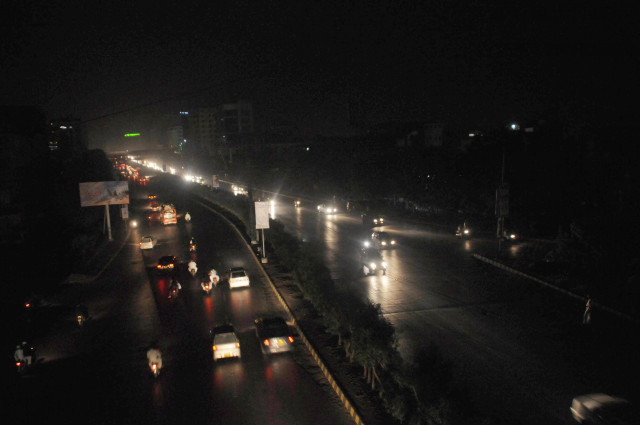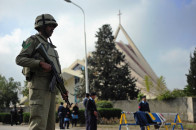No end in sight for Pakistan's energy crisis
It's a management crisis born out of indecisiveness, procrastination, not taking timely decisions, says Shahid Sattar.

Six weeks after Prime Minister Raja Pervaiz Ashraf promised that the electricity shortage would be his top priority, blackouts have reached a peak - reportedly up to 16 hours a day in urban areas and as much as 22 hours a day in the countryside.
But with political posturing becoming more acute as the weak coalition stutters towards general elections, there is no quick end in sight.
Unprecedented power failures blacked out over half of India for two days last week, affecting more than 600 million people when three national grids collapsed.
But in Pakistan, shortages day in day out highlight chronic underinvestment in infrastructure, long-term planning sacrificed to short-term expediency, lack of leadership, cronyism and corruption.
For ordinary people, it is almost unbearable, particularly during Ramazan.
Peak demand for electricity in the summer is around 18,000MW, with a third of that coming from air-conditioning, but power companies only manage to supply 13,000 to 14,000MW.
Angry protests and riots erupt every few days and the central bank has warned the energy shortages have effectively put a ceiling on economic growth.
The government's Planning Commission says power cuts shaved three to four percent off gross domestic product (GDP) in the financial year 2010-11, with industry bearing the brunt.
At the heart of the problem is so-called "circular debt", which the commission says stood at $4.4 billion in 2011-12.
The dual effect of the government setting low electricity prices and customers failing to pay for it means state utilities lose money, and cannot pay private power generating companies, which in turn cannot pay the oil and gas suppliers, who cut off the supply.
"It's a crisis of management, a crisis which has been born out of indecisiveness, born out of procrastination, not taking the decisions required at the right time," said Shahid Sattar, the Planning Commission's member for energy.
He dates the problem to the rule of military strongman Pervez Musharraf, when a massive boom in demand was not matched by investment in new power stations.
Raja Pervaiz Ashraf, burdened by corruption allegations from his time as water and energy minister but sworn in as prime minister on June 22 after the Supreme Court sacked his predecessor, promised to fix it.
In mid-July, a Rs12 billion bailout led to a noticeable let-up in the blackouts, but since then cuts have been as bad as ever.
Opposition leaders have sought to make hay, with Punjab Chief Minister Shahbaz Sharif of the Pakistan Muslim League - Nawaz (PML-N) backing protests and complaining vociferously that his province is suffering an unfair share of the power cuts.
With polls expected by April and rivalry fierce between the PPP and the PML-N, led by Sharif's brother Nawaz, there is little appetite for cooperation even on what analysts agree is a "genuine national crisis".
But neither is there a quick solution for whoever wins. The government needs to pay its bills, but the country also needs to generate more power.
Major projects such as the $12 billion Diamer Bhasha dam, which is expected to generate 4,500MW, will not come online for another five or six years.
The rivers and valleys of the mountainous north may offer more than 50,000MW of untapped hydroelectric potential, but Sattar says power generated from it could be unreliable and cannot guarantee year-round supply.
Coal reserves have been found in the Thar desert, but the quality is uncertain and international donors are unwilling to pump money into such an environmentally-damaging form of energy.
The government is keen to develop nuclear power as it tries to wean itself off expensive imported hydrocarbons - the country spends 7.5 percent of GDP on buying fuel, according to the Planning Commission.
There are currently three nuclear plants generating a total of 740MW of power and there are plans to expand this to 8,800MW, but only by 2030.
Saeed Alam Siddiqui from the Pakistan Atomic Energy Commission said two new reactors to be built by the end of 2017 would generate an extra 680MW.
But as Pakistan is not party to the Nuclear Non-Proliferation Treaty, it is excluded from trade in nuclear materials and technology and can rely only on its neighbour China for help.
Parallel efforts to reform publicly-owned generating and distribution companies have met fierce resistance - an attempt to replace the CEOs of power companies last year ended in failure after industrial action.
With Pakistan's 180 million population growing rapidly and demand rising by around 1,500 MW every year, a daunting battle lies ahead.
If no solution is found and violent protests continue, political analyst Hasan Askari warns Pakistan's ability to function as a state could be under threat.
"If these people can challenge one government they can challenge any government," he said. "Violence and agitation become the normal political style and you never have stability."



















COMMENTS
Comments are moderated and generally will be posted if they are on-topic and not abusive.
For more information, please see our Comments FAQ